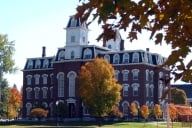You have /5 articles left.
Sign up for a free account or log in.
Some lawsuits aim at narrow targets, some go broad. Others focus on one specific target with a far broader goal in mind. Such is the case with a lawsuit filed Thursday by the American University of Antigua College of Medicine, which is directly suing the state medical board in Arkansas but is challenging, in a none-too-subtle way, the entire system for licensing doctors to practice medicine in the United States.
That is much-contested terrain, legally and otherwise. At a time of widespread (but not unanimous) recognition of a doctor shortage in the United States, there is very slowly growing support for the idea that making it easier for qualified foreign-trained doctors to earn approval to practice in American might be part of the solution (as this 2006 commentary from the then-head of the Association of American Medical Colleges suggests).
But because of concerns about the quality of the Caribbean schools' education -- or the protectionism of American medical schools, depending on where one sits -- skepticism, and often major regulatory hurdles, remain both for medical schools from outside the U.S. and Canada and for their graduates seeking to practice in the States.
The latter concern is the motivating factor behind the lawsuit filed Thursday by the Antiguan medical college, on behalf of two recent graduates and two current students, against the Arkansas State Medical Board and its members. The lawsuit, filed under the due process and equal protection clauses of the 14th Amendment, contends that Arkansas has discriminated against the right of the Antigua institution's students to seek licenses to practice medicine in the state by placing the foreign medical college on its list of "disapproved" schools ("medical schools that the board deems is [sic] unacceptable," its regulations read, whose graduates cannot qualify for licenses) without any independent review.
Instead, the legal complaint asserts, Arkansas has essentially subcontracted out its decision making authority to California, from which the Antiguan medical school has sought, but not earned (or at this point failed to earn), approval to operate in that state through California's own "difficult, arbitrary" licensure process. Neither Arkansas nor California, the lawsuit alleges, has done the sort of independent review of the Antigua college's curriculum, faculty or students that Arkansas law requires, and therefore Arkansas's inclusion of the Antiguan institution on its disapproved list violates the students' due process rights.
The lawsuit's other claim -- that the Arkansas policy violates the equal protection clause -- arises because of how Arkansas and California treat foreign medical schools, especially those whose students are mostly Americans. Neither state puts up barriers to graduates of accredited American or Canadian medical colleges, and California's policy, on which the lawsuit says Arkansas heavily relies, automatically includes on its "approved" list foreign medical schools whose students are predominantly not Americans. But foreign schools whose students are mostly Americans, like AU-Antigua's medical school and most of its Caribbean counterparts, get the state's full scrutiny.
That policy not only discriminates against the four American plaintiffs (two of whom are from Arkansas), AU-Antigua says, but also underscores the lawsuit's underlying point: that the various bodies responsible for accrediting American medical schools and for licensing doctors to practice in the country have "a history that spans several decades of wrongfully limiting and restricting the number of medical schools in the United States and the number of seats for students in those schools," and therefore limit the ability of schools outside the U.S. to compete with them. The parties it singles out are the Liaison Committee for Medical Education, which accredits U.S. and Canadian medical schools, and the American Medical Assocation and AAMC, which co-sponsor the accreditor.
"What this lawsuit is really about is [medical organizations'] efforts to continue to control the medical profession in the U.S. to limit doctors of American origin" to going to U.S. medical schools, said Leonard A. Sclafani, vice president and general counsel of American University of Antigua. "A U.S. citizen has a right to practice his chosen profession free of government restraint, and there's no rational basis here for this kind of illegal discrimination against Americans."
Alternative View From Arkansas
A lawyer for the Arkansas State Medical Board disputed many of the Antigua school's assertions. From a procedural standpoint, said William Trice, a federal court is unlikely to hear the student plaintiffs' claims because they have not applied for licensure in Arkansas, let alone been denied, and therefore "have not exhausted their state remedies," often a necessary precursor to successful filing of a lawsuit.
More substantively, Trice said, the Antigua college's lawsuit misrepresents the extent to which Arkansas has subjugated its own judgment to California or any other single state or source. "Our regulation allows us to disapprove schools that are disapproved or not recognized in at least two other states, and we collect other information in the information gathering process," said Trice. "We gather information from the various licensure and accrediting organizations, go to all of the other states and get their input, and, when it exists, negative information from at least two other states."
The fact that American University of Antigua does not appear on California's "disapproved" list in no way precludes Arkansas from counting it as one of the two states in which a foreign medical school "has not been approved or recognized" for Arkansas to deny licensure to its graduates, Trice said. Not being on California's approved list "is a negative," he added: "If you never finished your driver's test, you don't get the license, even if you're still in the middle of it."
Asked which other state or states had negatively assessed the Antigua institution, Trice said that neither he nor officials of the Arkansas board could answer that question on short notice. "The main thing to take home is that [our judgment] is based on a lot of different states sharing their information."
Sclafani, the lawyer for AU-Antigua, said Arkansas officials were trying to play down their dependence on California's judgment despite board members' statements in news articles last year acknowledging that they did not have the personpower or time to invest in independent reviews. It is unfair, and ultimately will be found illegal, he said, for Arkansas to produce a list of "disapproved" schools that makes it look like the state has "looked at a school and made its own determination, as if the school has gone through an approval process and been denied," when in fact "we haven't completed an approval process or Arkansas or in California, or ended up on California's disapproved list."
Antigua's medical school has earned approval of a sort, he said, from the only state that has looked deeply and critically into its operation. New York's medical board has approved Antigua to send its students to New York hospitals to complete the clinical portions of their Antiguan educations; students who go through that system are then qualified for licensure in New York.
Why would Arkansas, which has only one medical school and, like many states, faces a critical shortage of doctors, take such a restrictive stance against foreign schools? Sclafani asked. Most of the discussion about Arkansas's approach focused on questions about the quality of the foreign schools and their graduates' medical skills, but those behind the Antigua college's lawsuit -- echoing longstanding complaints by proponents of Caribbean and other foreign medical schools -- see a more protectionist bent.
Describing what they characterize as the Arkansas board's "collusion" with the national medical groups, the lawsuit says that the organizations restrict the approval of of foreign med schools and their graduates "under the guise of protecting the quality of the practice of medicine in the United States," but their "real purpose" is to "preserve and protect their monopolistic power base," and "preclude or limit competition from Americans who do not graduate from schools under their aegis."
A lawyer for the Association of American Medical Colleges, Joseph A. Keyes Jr., said that his group had not seen the lawsuit and so could not comment fully about those conspiratorial accusations. "AAMC is a sponsor of LCME, and is proud of the role it has played. Its jurisdiction is limited to schools in the U.S., and state licensure boards have the autonomy to set up their own procedures for licensure of doctors," Keyes said. "So this seems mostly like an issue for Arkansas."









